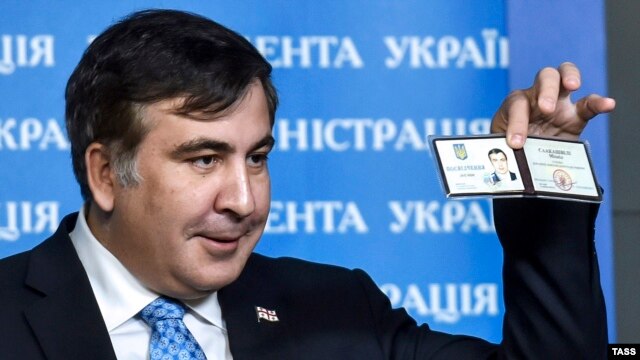Saakashvili confirmed as governor of Ukraine's Odesa region
| Publisher | Radio Free Europe/Radio Liberty |
| Publication Date | 30 May 2015 |
| Cite as | Radio Free Europe/Radio Liberty, Saakashvili confirmed as governor of Ukraine's Odesa region, 30 May 2015, available at: https://www.refworld.org/docid/558bc4c736.html [accessed 19 May 2023] |
| Disclaimer | This is not a UNHCR publication. UNHCR is not responsible for, nor does it necessarily endorse, its content. Any views expressed are solely those of the author or publisher and do not necessarily reflect those of UNHCR, the United Nations or its Member States. |
Last updated (GMT/UTC): 30.05.2015 12:38
By RFE/RL
 Former Georgian President Mikheil Saakashvili shows off his identification card as the head of an advisory council in Kyiv in February.
Former Georgian President Mikheil Saakashvili shows off his identification card as the head of an advisory council in Kyiv in February.
Former Georgian President Mikheil Saakashvili has been appointed governor of Ukraine's southwestern Odesa region, a move that could exacerbate tensions between Kyiv and Moscow amid Ukraine's shaky cease-fire with Russian-backed separatists.
Ukrainian President Petro Poroshenko made the announcement on May 30 at a televised event in the region's capital city of Odesa alongside Saakashvili, calling the former Georgian president a "great friend of Ukraine."
Interfax reports Poroshenko also signed a decree granting Saakashvili Ukrainian citizenship.
The announcement followed a recommendation by Poroshenko's cabinet that Saakashvili lead the Odesa region.
Saakashvili was Georgia's president during its brief 2008 war with Russia over the Moscow-backed breakaway Georgian region of South Ossetia.
Many Western officials see that conflict as a precursor to the Kremlin's seizure and annexation of Ukraine's Crimea territory in March 2014 and the ensuing war between Kyiv's forces and pro-Russian rebels in eastern Ukraine that has killed more than 6,100 people since April 2014.
The city of Odesa last year was the site of one of the deadliest civilian incidents since the conflict erupted in eastern Ukraine, with more than 30 pro-Russian activists dying after they reportedly sought refuge from a hostile crowd.
A city of 1 million people, Odesa lies less than 450 kilometers from Kyiv and hundreds of kilometers from the battle lines between central government forces and pro-Russian fighters who declared "people's republics" in eastern Ukraine.
Putin Critic
In April, Ukrainian authorities in Odesa said they detained more than 40 suspected members of a terror group who had allegedly planned a series of terrorist acts during celebrations marking the Orthodox Easter on April 12.
The Ukrainian Security Service (SBU) also said in April it detained three people suspected of involvement in a series of bombings in Odesa, some of them targeting organizations with ties to soldiers fighting against Russian-backed rebels in eastern Ukraine.
A fierce and relentless critic of Russian President Vladimir Putin, Saakashvili is loathed by officials in Moscow and regularly mocked on state-run Russian television.
"Saakashvili is Head of the Odesa Region," Russian Prime Minister Dmitry Medvedev wrote on Twitter. "When the circus comes to town... Poor Ukraine."
"Saakashvili – accused of numerous crimes against the Georgian people – gets appointed governor of Odesa," senior Russian Foreign Ministry official Konstantin Dolgov wrote on Twitter. "This is deeply symbolic of Kyiv's style of democracy."
During nearly a decade in power following the 2003 Rose Revolution, Saakashvili introduced major reforms before leaving the ex-Soviet republic after his presidency ended in November 2013.
The government that came to power after beating his party in 2012 parliamentary elections has accused him of fraud, organization of an assault, and abuse of office – charges he denies.
Saakashvili has been serving as the head of Ukraine's Consultative International Council of Reforms since February.
Poroshenko's appointment of several foreigners to senior posts in the Ukrainian government has raised some eyebrows at home. He has called the moves an effort to find "innovative solutions in the government" due to the "extraordinary challenges facing Ukraine."
With reporting by Interfax and RIA Novosti
Link to original story on RFE/RL website
